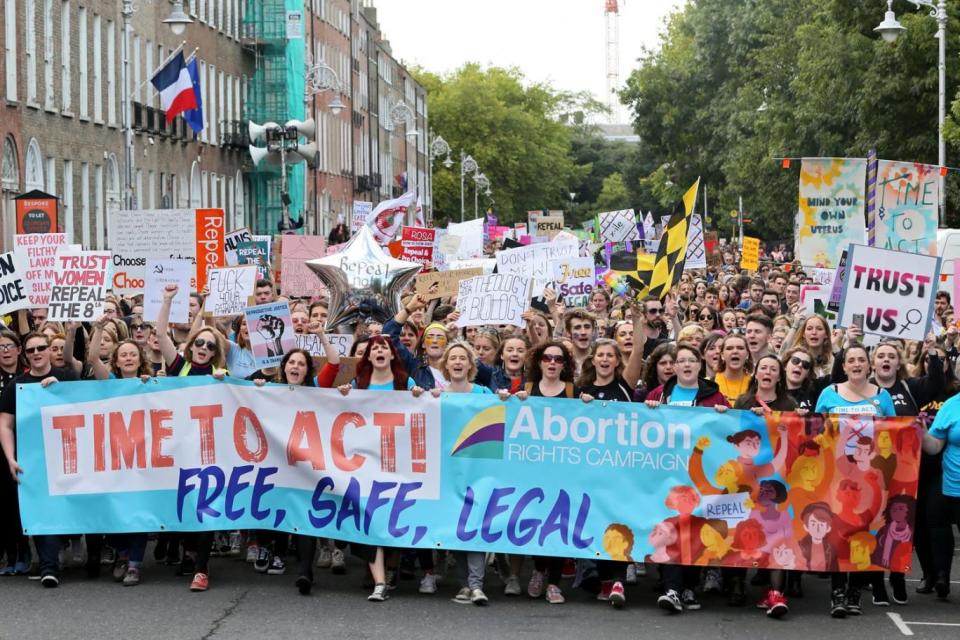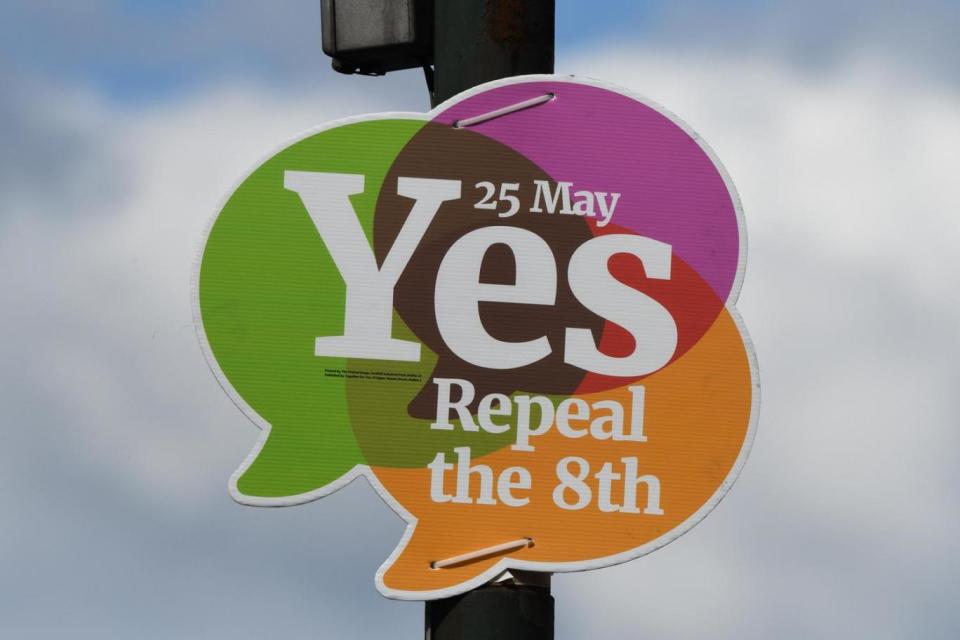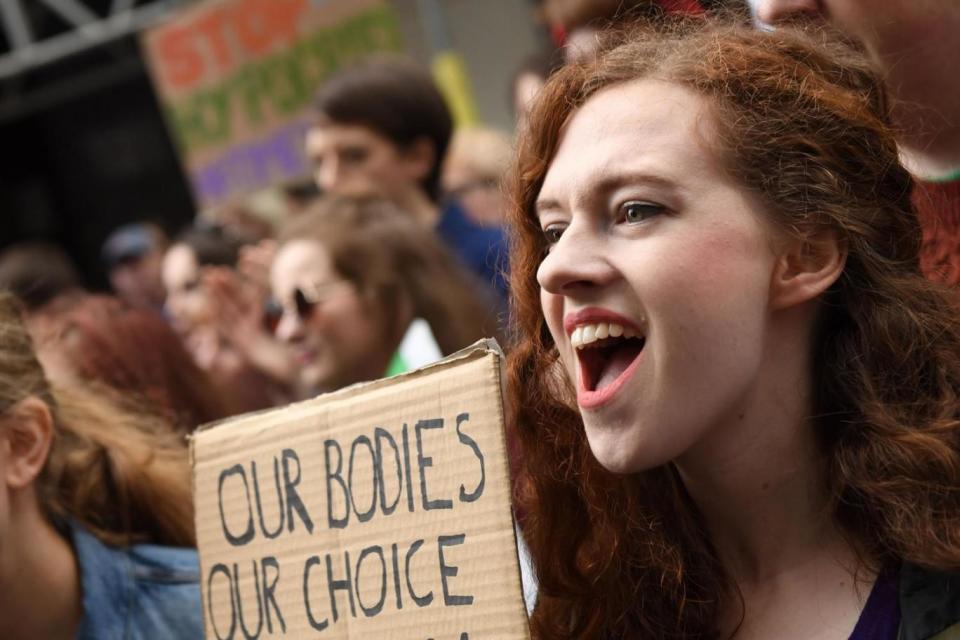Ireland abortion referendum: What will happen if the Irish vote Yes?
In 1983, a referendum in Ireland made abortion illegal under all circumstances. This is known as the eighth amendment.
Since 1992 women in Ireland have been allowed to travel abroad for abortions, but having an abortion in their own country has remained illegal. Many women can't afford to make the trip to a neighbouring country and have therefore been left with unwanted pregnancies. Those that could make the trip often did so alone, without telling friends or even family.
Today Ireland are holding a referendum on their constitution’s eighth amendment. If the majority vote to repeal the eighth, this will allow the government to legalise terminations.
What happens if Ireland vote ‘Yes’ and repeals the eighth amendment?
Last year, the Irish government held a Citizens Assembly to decide whether they would consider holding an abortion law reform. After hearing extensive evidence, the 99 randomly selected citizens voted in favour of legalising abortions – 64 per cent to 36 per cent.

On Friday, voters in Ireland will be asked if they want to repeal the eighth amendment and allow the government to change the laws surrounding abortion. If the country votes Yes, the laws that were made in 1983 and 1992 would be replaced with the following text:
“Provision may be made by law for the regulation of termination of pregnancy.”
This means the government would legislate to allow abortion for women who are up to 12 weeks pregnant, without justification, and after this time period too, if there is a risk of life to the woman, a medical emergency or a fatal foetal abnormality.
What happens if Ireland votes 'No'?
If Ireland vote ‘No’, there will be no change to the eighth amendment. It would still be illegal for women to have an abortion under any circumstance that isn't life threatening and she would still need to travel overseas to terminate the pregnancy. While EU flight laws allow Irish residents to fly between Ireland and the UK freely at present, it is unknown what impact Brexit will have on Irish women wanting to travel to the UK to have an abortion.
If the vote is 'No' it is not known whether there would be another referendum or chance to repeal the eighth amendment in the future.
According to an Irish Times/Ipsos MRBI opinion poll dated May 17, 58 per cent of voters will vote Yes and 42 per cent will vote No.
What is the eighth amendment?
Abortion was first made illegal in Ireland under the Offences against the Person Act of 1861. Over a century later, in 1983, pro-life activists (people who agreed abortion should be illegal) worried this act could be overturned so set about making it part of the Irish constitution.
A vote was held on September 7, 1983 which proposed to add an eighth amendment to the constitution. It read:
“The state acknowledges the right to life of the unborn and, with due regard to the equal right to life of the mother, guarantees in its laws to respect, and, as far as practicable, by its laws to defend and vindicate that right.”
Two-thirds, or 66.9 per cent, of the population voted Yes, which gave equal rights to the mother and the unborn and effectively banned abortion in all circumstances. It is important to consider that only 53 per cent of the population turned out to vote – just 1.2million people – and 33.1 per cent voted No.

Were there any allowances made to the eighth amendment?
In 1992, a 14-year-old girl in Ireland became pregnant as a result of rape – known as ‘Case X’. She claimed to be suicidal and wanted to travel to the UK for abortion – but was prevented to under law.
However, Ireland’s Supreme Court decided she had a right to have an abortion because there was a ‘real and substantial’ risk to hers and the unborn child's life.
This led to three referendums being held in November 1992, one attempting but failing to remove suicide as grounds for an abortion (another referendum in 2002), and the others accepting that a woman could travel abroad for an abortion and that information about services in other countries was allowed to be made available to her.

When did Ireland decide to hold this new referendum?
Eight years ago, in 2012, the European Court of Human Rights ruled Ireland was violating the European Convention on Human Rights and cited there was not enough clarity on the grounds in which women in Ireland would be allowed a legal abortion.
Things started to pick up in 2012 after the devastating death of Savita Halappanavar when she died in a Galway hospital due to complications from a septic miscarriage – despite having requested an abortion when she first fell sick, one which could have saved her life.
Her death caused the Protection of Life During Pregnancy Act to be passed as law in 2013, which stated that abortions could be carried out legally in three scenarios. These were: risk of loss of life from physical illness, risk of loss of life from suicide and risk of loss of life from physical illness in an emergency.
So as it stands today, women in Ireland are only legally allowed to have an abortion if there is a real threat to their life.

This could all change today, as the Repeal the Eighth movement – led largely by a younger generation of women fighting for rights to their own bodies – made enough strides for the government to listen up and hold a referendum in the first place.
We will find out whether they have been successful tomorrow, when the results will officially be announced.

 Yahoo News
Yahoo News 
